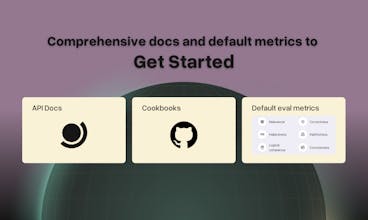Selene by Atla
Frontier models to evaluate generative AI
141 followers
Frontier models to evaluate generative AI
141 followers
Find and fix AI mistakes at scale, and build more reliable GenAI applications. Use our LLM-as-a-Judge to test and evaluate prompts and model versions.












Selene by Atla
Hey Product Hunt! Maurice here, CEO and co-founder of Atla.
At Atla, we’re a team of researchers and engineers dedicated to training models and building tools that monitor AI performance.
If you’re building with AI, you know that good evals are critical to ensuring your AI apps perform as intended.
Turns out, getting accurate evals that assess what matters for your use case is challenging. Human evaluations don’t scale and general-purpose LLMs are inconsistent evaluators. We’ve also heard that default eval metrics aren’t precise enough for most use cases, and prompt engineering custom evals from scratch is a lot of work.
🌖 Our solution
Selene 1: a LLM Judge trained specifically for evals. Selene outperforms all frontier models (OpenAI’s o-series, Claude 3.5 Sonnet, DeepSeek R1, etc.) across 11 benchmarks for scoring, classifying, and pairwise comparisons.
Alignment Platform: a tool that helps users automatically generate, test, and refine custom evaluation metrics with just a description of their task, little-to-no prompt engineering required.
🛠️ Who is it for?
Builders of GenAI apps who need accurate and customizable evals—whether you’re fine-tuning LLMs, comparing outputs, or monitoring performance in production. Evaluate your GenAI products with Selene and ship with confidence.
You can start with our API for free. Our Alignment Platform is available for all users.
We’d love your feedback in the comments! What challenges have you faced with evals?
Selene by Atla
@masump Hey Masum! Selene won't adapt itself out of the box, but we've built the alignment platform to make it easy to continually align your LLM judge to changing requirements.
Fable Wizard
Keeping AI performance in check is no small task, and having an evaluator specifically trained for this sounds like a game-changer! How does Selene handle nuanced tasks where context is key—does it adapt based on different use cases?
Selene by Atla
@jonurbonas Hey Jonas! Yes indeed. We trained Selene to be easily customizable. It excels at following evaluation criteria and score rubrics closely, and responds well to fine-grained steering. For instance, developers using LLM Judges frequently encounter the problem of evals getting saturated, i.e. model responses receiving high scores too frequently, making the eval less useful. In such situations, one might want to “make it harsher” such that fewer responses receive high scores.
you can read more here: https://www.atla-ai.com/post/selene-1
Selene by Atla
@jonurbonas Thanks for the support! We built the alignment platform to make it super straightforward to adapt Selene to different use cases. Just describe your use case in natural language and the platform will auto-generate eval prompts to assess your AI app.
To your point, we trained Selene to be steerable to custom evals. For example, you might want to “make it harsher” so fewer responses receive high scores. Alternatively, you might want to “flip the scores” so that the eval gives high scores to failures rather than successes. Graph 👈 Here's a graph from our testing on benchmarks that shows this
This is actually super interesting, and I'll check it out!
Selene by Atla
@mia_k1 Thank you! Let us know if you have any questions